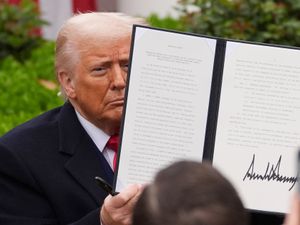Benny Gantz, centrist member of Israel’s war cabinet, resigns
Prime Minister Benjamin Netanyahu still controls a majority coalition in parliament but becomes more heavily reliant on his far-right allies.

Benny Gantz, a centrist member of Israel’s three-man war cabinet, has announced his resignation, accusing Prime Minister Benjamin Netanyahu of mismanaging the war effort and putting his own “political survival” over the country’s security needs.
The move does not immediately pose a threat to Mr Netanyahu, who still controls a majority coalition in parliament.
But the Israeli leader becomes more heavily reliant on his far-right allies.

Mr Gantz said Mr Netanyahu is “preventing true victory” and “making empty promises”, adding that the country needs to take a different direction as he expects the fighting to continue for years to come.
The popular former military chief joined Mr Netanyahu’s government shortly after the October 7 Hamas attack in a show of unity.
His presence also boosted Israel’s credibility with its international partners.
Mr Gantz has good working relations with US officials.
He had previously said he would leave the government by June 8 if Mr Netanyahu did not formulate a new plan for post-war Gaza.
Mr Gantz scrapped a planned news conference on Saturday night after four Israeli hostages were dramatically rescued from Gaza earlier in the day in Israel’s largest such operation since the eight-month war began.
At least 274 Palestinians, including children, were killed in the assault, Gaza health officials said.
Mr Gantz called for Israel to hold elections in the autumn, and encouraged the third member of the war cabinet, defence minister Yoav Gallant, to “do the right thing” and resign from the government as well.

Mr Gallant has previously said he would resign if Israel chose to reoccupy Gaza, and encouraged the government to make plans for a Palestinian administration.
On Saturday, Mr Netanyahu had urged Mr Gantz not to leave the emergency wartime government.
“This is the time for unity, not for division,” he said, in a direct plea to Mr Gantz.
Mr Gantz’s decision to leave is largely “a symbolic move” due to his frustration with Mr Netanyahu, said Gideon Rahat, chairman of the political science department at the Hebrew University of Jerusalem.
He noted it could further increase Mr Netanyahu’s reliance on extremist, right-wing members of his government, led by national security minister Itamar Ben-Gvir and finance minister Bezalel Smotrich.
“I think the outside world, especially the United States, is not very happy about it, because they see Gantz and his party as the more responsible people within this government,” said Mr Rahat.
On Sunday evening, Mr Ben-Gvir demanded a spot in the war cabinet, saying Mr Gantz and the smaller cabinet had bungled the war effort due to “dangerous” ideological decisions.
Hamas took some 250 hostages during the October 7 attack that killed about 1,200 people.
About half were released in a week-long ceasefire in November.
About 120 hostages remain, with 43 pronounced dead.
At least 36,700 Palestinians have been killed in the fighting, according to Gaza’s Health Ministry, which does not distinguish between fighters and civilians.





